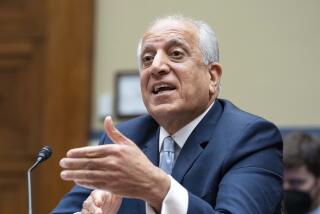Philip Habib; U.S. Envoy, Trouble-Shooter
- Share via
DIJON, France — Philip Habib, the diplomatic trouble-shooter who played a key role in major U. S. foreign policy initiatives from the Middle East to Vietnam has died, the U. S. Consulate here said Tuesday. The former undersecretary of state was 72.
Habib died Monday of a heart attack during a private visit to the town of Puligny-Montrachet in the Burgundy region, the consulate said.
The area is known for its fine wines, and Habib, who made private trips to the region, had visited winemakers since his arrival Sunday, according to Agence France-Presse.
Fellow residents at his hotel said he suffered the attack there and rescue workers were unable to revive him.
Habib, who lived in San Francisco, had suffered at least two previous heart attacks.
State Department deputy spokesman Richard Boucher called Habib “a man of great courage, unparalleled tenacity, high intellect and deep warmth. . . . He nurtured the careers of many of those who have risen to the highest ranks of the service today, and we will all miss him.”
Habib, who spent three decades in diplomatic service, was last in the public eye as special envoy to President Ronald Reagan, who in 1981 called him out of retirement to try to end the Lebanese civil war, which threatened to spread into a conflict between Syria and Israel.
Habib also served during Reagan’s second term, as special envoy to the Philippines and Central America. Habib applied his diplomatic talents to Central America but resigned after 16 months in 1987 out of frustration with conservatives in the Reagan Administration who opposed any compromise with Nicaragua.
He had lived quietly since, working as a senior research fellow at Stanford University and speaking occasionally before various world affairs councils and similar organizations.
When he retired in 1978, Habib was undersecretary of state for Political Affairs, the highest position attainable by a career Foreign Service officer.
Perhaps his most publicized assignment came in 1977 when he was asked by President Jimmy Carter to help arrange the meetings between Egyptian President Anwar Sadat and Israeli Prime Minister Menachem Begin that led to the Camp David peace agreement.
His first major public role came in 1969 when he was acting head of the U. S. delegation to the Paris talks. Those peace talks eventually ended American involvement in Vietnam.
Born in New York City, Philip Charles Habib was the son of a grocer of Lebanese descent. He graduated from the University of Idaho and earned a doctoral degree in economics at UC Berkeley in 1952. He began his Foreign Service career as third secretary at the U. S. Embassy in Canada. He later served in New Zealand, Seoul, and Saigon, where he was named political counselor to Ambassador Henry Cabot Lodge as the Vietnam War escalated.
He eventually was recognized as the State Department’s most knowledgeable specialist on Southeast Asia, handling negotiations in the Paris talks on Vietnam, working as ambassador to South Korea and other assignments.
His position papers on Vietnam were credited with influencing President Lyndon B. Johnson to restrict American bombing of North Vietnam in 1968 and to begin negotiations toward a cease-fire.
At the State Department, Habib’s deep booming voice often dominated the seventh-floor, which was occupied by the secretary of state and other high officials.
Habib, who was made a commander of France’s Legion of Honor in 1988, is survived by his wife, Marjorie, and two daughters. He will be buried in San Francisco.
More to Read
Sign up for Essential California
The most important California stories and recommendations in your inbox every morning.
You may occasionally receive promotional content from the Los Angeles Times.













